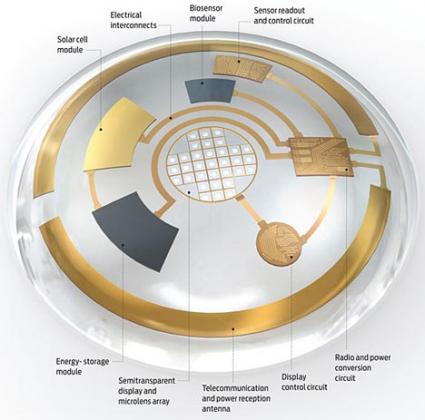Future Now
The IFTF Blog
Continuous glucose monitoring in the blink of an eye
Imagine a contact lens that could continually and non-invasively monitor your biomarkers and health indicators? That is the potential of an electronic lens being developed by Babak Parviz, a researcher at the University of Washington. He published an article in the September 2009 issue of IEEE Spectrum in which he describes his work (nod to MobilehealthNews for the lead).

He and his students have been producing, in small numbers, contact lenses with simple built-in sensors and other electronics (be sure to check out the sidebar). A lens with an LED, powered wirelessly with RF "barely hints at what will soon be possible with this technology."
While part of the article is devoted to how these lens could be used to augment reality, Parviz also describes their medical potential, starting with his success thus far at glucose monitoring:
[N]oninvasive monitoring of the wearer’s biomarkers and health indicators could be a huge future market. We’ve built several simple sensors that can detect the concentration of a molecule, such as glucose. Sensors built onto lenses would let diabetic wearers keep tabs on blood-sugar levels without needing to prick a finger. The glucose detectors we’re evaluating now are a mere glimmer of what will be possible in the next 5 to 10 years.
He goes on to observe:
Contact lenses are worn daily by more than a hundred million people, and they are one of the only disposable, mass-market products that remain in contact, through fluids, with the interior of the body for an extended period of time. When you get a blood test, your doctor is probably measuring many of the same biomarkers that are found in the live cells on the surface of your eye—and in concentrations that correlate closely with the levels in your bloodstream. An appropriately configured contact lens could monitor cholesterol, sodium, and potassium levels, to name a few potential targets.
Despite the exciting potential for these lens, the article is not all Pollyanaish. Parviz explains several of the challenges he and his team face. But I would like to believe that Parviz will overcome these challenges, and that his work now really is "a mere glimmer" of what he will accomplish "in the next 5 to 10 years."



